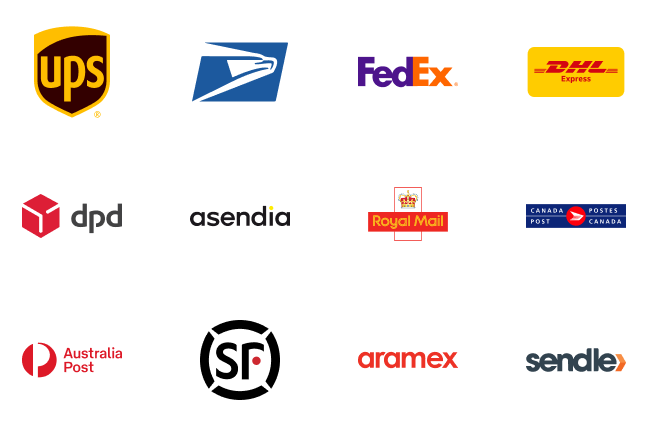Preparing to Go Global
Can I import my product to my target countries?
Start by visiting the official customs website for the countries you'd like to ship to and take a look at the prohibited and restricted items. Products such as plants, seeds, alcoholic beverages, food products, and more could potentially be quarantined in customs for a long period of time, or be outright prohibited.
What issues could I encounter when shipping overseas?
Some countries are easier to ship to than others. For example, India requires more personal documentation from the receiver than most countries. In Brazil, there are multiple taxes and duties that are imposed on imports. Economic instability makes delivery even more complicated.
Being aware of these potential issues will allow you manage expectations and build trust with your overseas customers. Check country specific restrictions, or read our in-depth country guides for more information:
Does my product contain dangerous goods?
In the shipping world, dangerous goods can be anything that, if not handled with care, could harm those handling them in transit.
Batteries and liquids are a good example: they are not dangerous by themselves, but they can contain a dangerous component (such as being flammable.) Couriers must be aware if your shipment contains these materials so they can handle them carefully.
This can also mean that your shipment may have additional restrictions. Some couriers may not allow dangerous goods shipments to fly, or can charge extra fees to handle these shipments.
Learn more about dangerous goods
What are sales taxes and duties, and will they apply to my shipment?
Sales Taxes are required financial obligations levied by a government on income, goods, and activities.
Duties are a tax payable to the government, charged on goods and financial transactions.
Taxes and duties make the price of imported goods more expensive for consumers. Governments tax imports because they want to:
1. Protect domestic companies from foreign competitors
2. Control the flow of certain products
3. Raise revenue through taxes
Every country has a tax threshold, which is the amount where a person begins paying taxes. Tax and duty may not apply to every international shipment, so it's best to research the tax thresholds for each country you want to ship to so you can communicate this to your customers effectively.
Learn more about import taxes and duties
Learn more about VAT
Do I need shipping insurance?
Most worldwide express couriers insure domestic and international shipments with a value up to $100USD by default; purchasing additional insurance may not be needed. However, if you use a postal courier (such as the USPS) they may not offer automatic insurance unless you are using one of their premium services.
Learn more about shipping insurance
{{ download_guide_international_shipping }}
Start Shipping
Automate your shipping to make logistics more efficient
Automation is taking over every industry, shipping and logistics included. Everyone has access to apps and tools that will streamline logistics, which means you can ship like a boss in no time.
Find shipping tools that can:
- Import your orders from all your sales channels into one platform
- Generate shipping labels
- Pre-fill customs documents and declarations to ensure accuracy and completeness
- Automatically send tracking numbers to your customers via email
- Create automation rules to process your orders even faster
- Schedule your pickups online
Choosing the right couriers for your business
Psst! Want to know a secret?
The best way to avoid overspending on shipping is to work with multiple couriers.
Some shipping solutions are better for certain countries. To find the best couriers for your business, it's important to compare prices, delivery times, and tracking quality.
- Pricing: This is dependent on the type of courier you use. Postal couriers are the cheapest, while express couriers are pricier (but provide better service.)
- Delivery times: Many customers want fast delivery options. Some are willing to wait. Offer multiple solutions with different delivery times to appeal to everyone.
- Tracking quality: Choose a courier that offers good tracking. This will reduce the number of customer service requests and the chances of your shipment getting lost.
Compare couriers, pricing, delivery times, and tracking quality all in one place.
Display rates at your store checkout
Optimizing your online store's checkout is key to reducing cart abandonment. In fact, 25% of customers abandon their cart due to unexpected shipping costs at checkout.
Avoid showing static shipping rates, as they are unclear and don't provide information on taxes, duties, and the courier.
Instead, offer dynamic rates at checkout. Provide optimal shipping options for shoppers based on their location and show costs such as taxes, duties, and handling fees upfront to lower cart abandonment.
Tax & Duty
When the value of a shipment is above the tax threshold for a country, duties will apply. There are two ways to pay for duties:
Deliver Duty Unpaid (DDU): Duty is not included in the shipping cost and must be paid for when the item arrives at the destination port.
Delivery Duty Paid (DDP): Duty is included in the shipping cost at checkout, and has already been paid for before the item arrives at the destination port.
We recommend using DDP at your store checkout to avoid additional delays at customs. Learn more.
Documents and declarations
It's true: there's more paperwork required when you ship products internationally.
But don't let this scare you. The good news is there are many apps that can automatically generate this paperwork for you, so you can do away with the pen and paper.
You can generate all the shipping documents you need with Easyship.
Hidden fees
The shipping industry can be known for not being transparent with costs. Here are some common fees express couriers charge that you should be aware of:
- Fuel surcharge: Fluctuates as it's based on oil prices
- “Remote” or “Extended area” surcharge: Applies if delivery address is far from the usual collection path of the courier
- Oversized or heavy items: Applies if your parcel exceeds a courier's standard dimension or weight
Learn more about hidden fees
Next Level Shipping
Cutting costs: the cheapest way to ship internationally
No one wants to overpay on shipping. We've done some research, and the short answer is that using a postal courier is most likely the cheapest way to ship internationally.
However, if you're looking for a shipping solution that's faster than a postal courier but not as expensive as an express courier, consider using regional couriers, as they focus their delivery on certain regions or areas around the world.
Learn more tips on how to save on shipping.
Find out who's better: UPS vs FedEx.
Tracking notifications
While it's tempting to cut corners when it comes to shipping, we don't recommend choosing a service that provides limited tracking. To build trust with overseas customers, choosing a shipping solution that provides end-to-end tracking for your package allows them to closely monitor their parcel while reducing the risk of loss.
If the customer still has questions about their shipment, it's best to avoid over-promising and manage expectations accordingly.
What to do when your shipment is stuck in customs
There are many reasons why a shipment might be stuck at customs. The reasons can differ in severity from high (your goods are prohibited) to low (having the incorrect paperwork).
Here's what you can do to get your parcel out of customs limbo:
- Contact your courier directly. Express couriers can help customs clear your shipment
- Find out if there are any outstanding taxes to be paid. Arrange payment and settle the balance ASAP
- Ensure there is no missing or incorrect paperwork. Express couriers might be able to help you recover any missing paperwork
What else to do when your shipment is stuck in customs


















































.avif)
.avif)

.avif)
.avif)


.avif)


.avif)










.avif)
.avif)



.avif)
.avif)


.avif)
.avif)


.avif)





